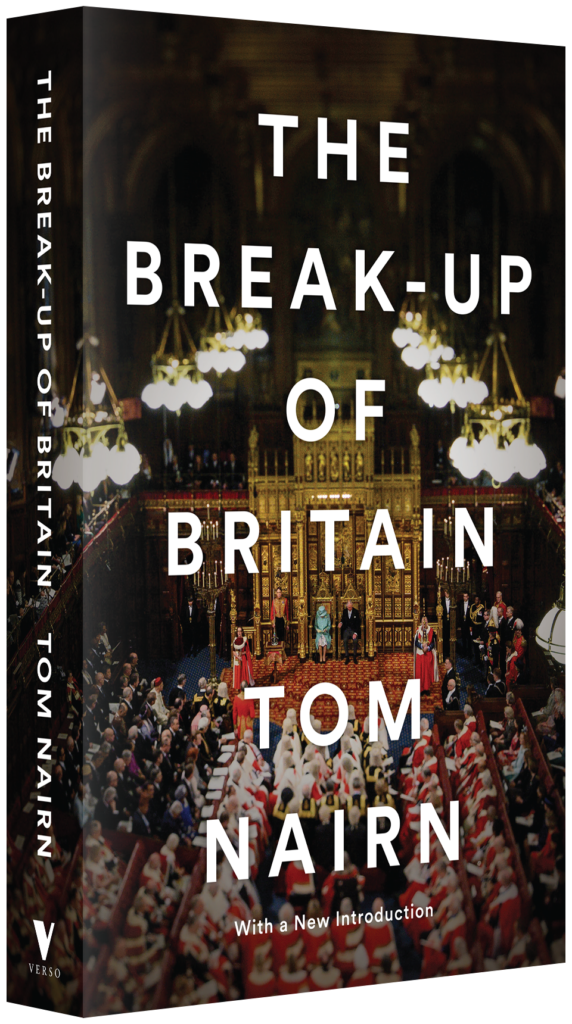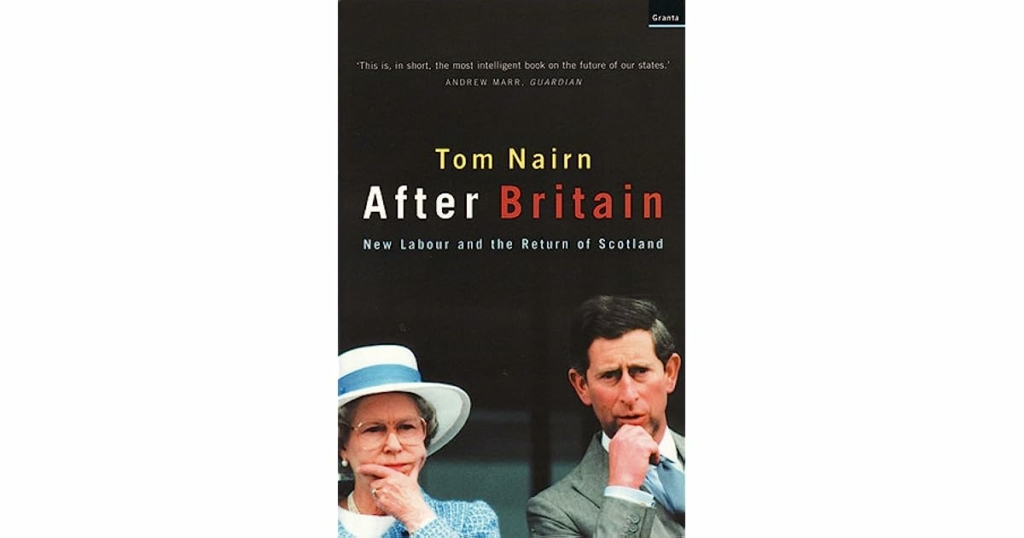Edinburgh to host major conference on democracy and constitutional reform in honour of Tom Nairn
Anyone who has lived through New Labour; Starmer’s posturing; the endless Royal deaths, marriages, coronations, Jubilees and divorces; the Johnson debacle; or Gordon Brown’s endless Federalism wheeze; will recognise the Parody Britain described by Tom Nairn when he wrote of the UK as a
“changeling Kingdom of Thatcher, Major and Blair — a parody of Britain which strives to rejuvenate itself by will-power, charisma, histrionics, cascades of “new ideas” and ingenious policies from cones to domes — anything except a new political constitution. Within this non-stop, non-revolution from above, what we see are features of revered tradition reinvented as farce, and sometimes transformed into their opposites.”
This autumn there’s to be a major conference in Edinburgh – the Break Up of Britain – to celebrate Nairn’s work and explore his themes and ideas. Several speakers have already signed up to be part of the discussion on Saturday 18 November, including Fintan O’Toole, Isabel Hilton, Kojo Koram, Joyce McMillan, Neal Ascherson, Hilary Wainwright, and James Robertson.
The conference will address key aspects of Nairn’s thought and debate a range of issues related to Britain’s ailing democracy.
Lesley Riddoch, one of the speakers has said:
“The Break-up of Britain conference is a politically ambitious attempt to connect everyone across these islands who believe the days of Westminster sovereignty are over — and that’s a lot of people.
“It includes independence supporters in Scotland and Wales, but also folk in England who back the right to self-determination amongst other nations in the UK as well as their own; Irish people on both sides of the border exploring the possible conditions for reunification; and English activists who want to transform their country from being the most centralised in Europe.
“Can all these different interests find common cause? We intend to find out because the British status quo is archaic and untenable — as the late and celebrated writer Tom Nairn pointed out half a century ago.”
The event will also challenge the emerging authoritarian consensus at Westminster, which has seen successive UK governments attack immigrants, the labour movement and environmental protesters.
Tickets are now on sale, with concessionary rates for students and those unable to pay full price, and can be purchased via the conference website or on the event’s Ticket Tailor page.
Donations to support the conference can be made on the event’s Go Fund Me page or via the website.
Conference partners include openDemocracy, the Scottish Independence Foundation, Compass, Bella Caledonia, Verso, Democratic Left Scotland, Europe for Scotland, the Barry Amiel and Norman Melburn Trust, and The Byline Times.

The event is being held in honour of the late Scottish political thinker Tom Nairn, who died in January aged 90. Nairn is best known for his 1977 essay collection The Break-up of Britain, which anticipated the rise of Scottish nationalism and the demise of the British state.
As Rory Scothorne has written about Nairn:
“Whether he was explaining the 1960s British class system for the New Left Review, or theorising globalisation in the London Review of Books decades later, at every step of his career he reached boldly into the future and came back bearing prophecies of extraordinary analytical and rhetorical power.”
“In 1977’s The Break-up of Britain, he gave us both a phrase and a framework for understanding the deep schisms of geography, identity and politics which continue to transform the strange place that he called ‘Ukania’. In 1988’s The Enchanted Glass he produced the most scathing and sophisticated critique of the British monarchy ever committed to print. Across a life that spanned continents and languages, he was a model intellectual: a brilliant, original writer, relentlessly committed to both his own country of Scotland and an international republic of ideas.”

As Britain staggers through the present ‘constitutional catatonia’ as Nairn called it, the self-harm of Brexit and the different straining voices of Ireland, Wales, Scotland and, yes England, Nairn’s ideas seem more relevant than ever.
Buy your tickets HERE.
Read more about the event HERE.

This view of a declining UK is felt equally in Northern Ireland. The malign influence of Brexit has impacted this part of the country particularly badly – both politically and economically. It is true that, economically, we could be better off because of the NI Protocol (open access to both British and European markets) but the political damage has been such that even this silver lining cannot be realised. The end result is a province with the worst health indicators in the British Isles, an education system which is on its knees and a proposal to achieve savings by turning off street lighting from January to March 2024. While we struggle with a £0.5 billion deficit, across the border Ireland is enjoying a budget surplus of €11 billion. They are even proposing to help us out by funding a major expansion of the Magee (Derry) campus of Ulster University and other infrastructure projects.
Historically, the main drivers of opposition to a United Ireland were the perception of poor living standards south of the border and undue influence of the Roman Catholic church on government in the Republic. Neither of these perceived negatives applies any more.
Wouldn’t it be great if somebody could come up with a constitutional solution that would save both Scotland and Northern Ireland from continued membership of this mal-functioning dis-United Kingdom. In fact, somebody has: ‘The Flight of the Gaels’ by Robert Whitford (ISBN 978-1-3984523-2-9) proposes offering a referendum choice not only of leaving or remaining in the United Kingdom but a third option of forming a Scottish-Irish Federation. The federation option prevails in the author’s analysis, the outcome being a federal parliament based at Stormont, Belfast, with an elected federal president, and national parliaments in Dublin and Edinburgh. This book will be therapeutic reading for all those in Scotland and Northern Ireland who may b contemplating what a positive political future without the UK, but within Europe, might look like.
“a third option of forming a Scottish-Irish Federation. .”The federation option prevails in the author’s analysis, the outcome being a federal parliament based at Stormont, Belfast, with an elected federal president, and national parliaments in Dublin and Edinburgh.
An Independent Scotland-Reunited Ireland link-up could well be a possibility, sometime down the line after both countries have well bedded in long-desired changes to the current UK set-up. Following a referendum on the topic in each country.
A federal parliament based at Stormont, Belfast lording it over “national parliaments in Dublin and Edinburgh” is a major No-No.
Bear in mind Stormont ‘s track record as a supremacist, sectarian set-up for the first 50 years of its existence and Unionists’ constant refrain of “No No Never, never, never” as they held the line, ceding “not an inch” in their refusal to move with the times and demographic changes over the last 25 years since the Belfast/Good Friday Agreement
I think Ben has misunderstood the proposition regarding use of Stormont as the location of the federal parliament. This institution would have nothing to do with the old unionist-dominated parliament. It would be elected by the people of Scotland and Ireland and members sitting there would be from parties standing for election in both countries. According to Robert Whitford’s blueprint, the use of the strategically-located and architecturally impressive Stormont building would not involve any Northern Ireland entity lording it over anybody; rather it would be the seat of federal governance by FMPs elected from Scotland and the whole of Ireland.
Ben, your suggestion that Scotland and Ireland should first establish their independence before moving to consider a federation of the two nations misses a key element of the author’s pro-federation argument. The problem is that in both Scotland and Northern Ireland the prospects for achieving 50% + support for constitutional change do not look promising in present circumstances. The author’s idea is that the option of a Scottish-Irish federation might move some in the middle ground towards support for constitutional change where, currently, the binary option would probably fail do do so. The constituencies most likely to be moved in this direction include soft nationalists in Northern Ireland (to be found within the Alliance Party and the Ulster Unionist Party) who worry about Loyalist opposition to constitutional change and soft nationalists in Scotland who worry about the strength of an independent Scottish economy. Robert Whitford explains his reasons for assuming that the federation option would help to allay those worries. In the narrative of ‘The Flight of the Gaels’, independence for Scotland and United Ireland are achieved first before the new parliaments agree to the establishment of the federation.
Rob – I would say that the chance of obtaining a 50+% for independence in Scotland are roughly 50/50 at present.
The chance of Scottish electorate being granted the opportunity to vote on independence by Westminster via Section 30 are far less primarily because the outcome is on a knife edge. I would go further and say that the chances of Westminster granting a Section 30 fall as support for independence rises until it is sustained at >60% at which point it will become impossible to resist – though it won’t stop Westminster trying!
On a more serious note speaking as someone who started supporting independence from 2014, a stance that has been firmed up by Brexit any federal arrangements would have to enable Holyrood to have full powers except those they wish to share with Westminster.
Spot on. This conference comes at exactly the right time. Well done Bella, and others, for organising it.
My personal opinion, given the fact that since 2014 England has refused to respect the Union of 1707, is that political violence by Scottish nationalists should not be ruled out.
At this stage, I certainly would never condone any physical harm against another human being in any shape or form, but there are other forms of violence like blowing things up the English dictatorship care about that may be worth looking at…
I as a Scottish European, reserve my right to defend the sovereignty of my country against these constant impositions by the country of England, a foreign power…